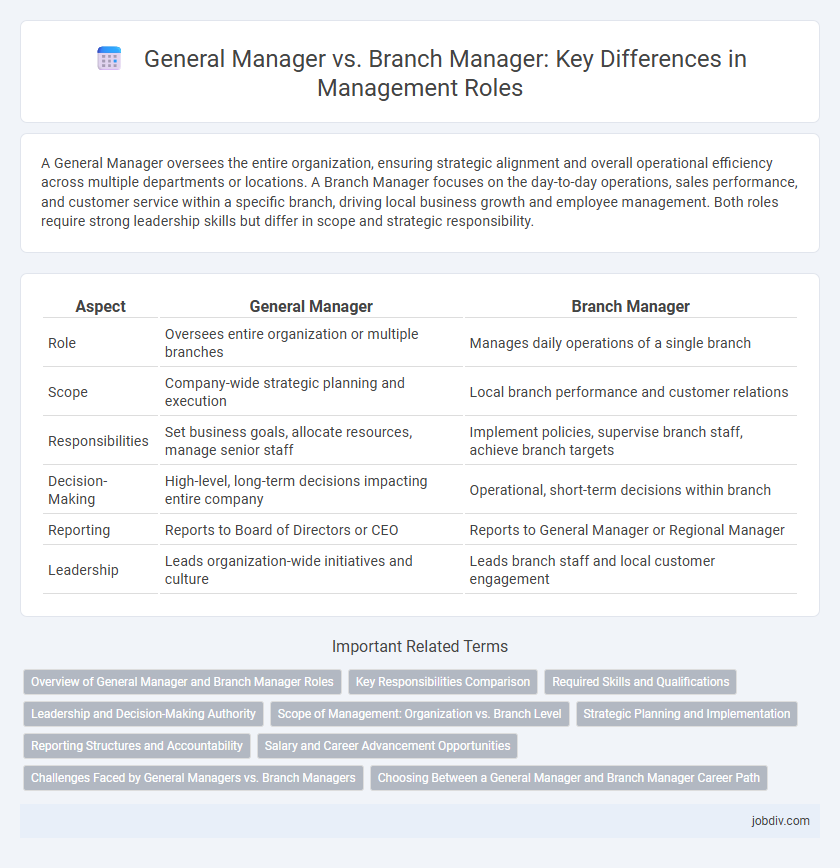A General Manager oversees the entire organization, ensuring strategic alignment and overall operational efficiency across multiple departments or locations. A Branch Manager focuses on the day-to-day operations, sales performance, and customer service within a specific branch, driving local business growth and employee management. Both roles require strong leadership skills but differ in scope and strategic responsibility.
Table of Comparison
| Aspect | General Manager | Branch Manager |
|---|---|---|
| Role | Oversees entire organization or multiple branches | Manages daily operations of a single branch |
| Scope | Company-wide strategic planning and execution | Local branch performance and customer relations |
| Responsibilities | Set business goals, allocate resources, manage senior staff | Implement policies, supervise branch staff, achieve branch targets |
| Decision-Making | High-level, long-term decisions impacting entire company | Operational, short-term decisions within branch |
| Reporting | Reports to Board of Directors or CEO | Reports to General Manager or Regional Manager |
| Leadership | Leads organization-wide initiatives and culture | Leads branch staff and local customer engagement |
Overview of General Manager and Branch Manager Roles
The General Manager oversees the entire organization's operations, strategic planning, and overall performance, ensuring alignment with corporate objectives and long-term growth. In contrast, the Branch Manager focuses on managing the daily operations, sales targets, and staff within a specific branch, driving local customer satisfaction and operational efficiency. Both roles require strong leadership and decision-making skills but differ in scope, with the General Manager handling broader organizational responsibilities while the Branch Manager concentrates on localized execution.
Key Responsibilities Comparison
The General Manager holds overarching responsibility for the entire organization's strategic planning, resource allocation, and overall operational performance. In contrast, the Branch Manager focuses on managing the daily operations, sales targets, and customer service within a specific branch location. While the General Manager drives company-wide policies and goals, the Branch Manager ensures local execution and team management aligned with corporate standards.
Required Skills and Qualifications
General Managers require advanced leadership abilities, strategic planning expertise, and extensive experience in overseeing multiple departments to drive overall organizational growth. Branch Managers must possess strong operational management skills, excellent customer service capabilities, and a deep understanding of local market dynamics to ensure branch profitability. Both roles demand effective communication, problem-solving aptitude, and a bachelor's degree in business administration or a related field, with General Managers often requiring an MBA or equivalent advanced qualification.
Leadership and Decision-Making Authority
A General Manager holds broader leadership responsibilities, overseeing multiple departments or branches with strategic decision-making authority that shapes the overall direction of the organization. In contrast, a Branch Manager exercises leadership within a specific location, focusing on operational decisions that drive branch performance and customer satisfaction. The General Manager's role involves long-term planning and resource allocation, while the Branch Manager emphasizes day-to-day management and local team motivation.
Scope of Management: Organization vs. Branch Level
General Managers oversee the entire organization, directing multiple departments and aligning company-wide strategies to achieve overarching business goals. Branch Managers focus on the operational management of a specific branch, handling local staffing, sales, and customer service to ensure branch-level objectives are met. The scope of management for General Managers is broad and strategic, while Branch Managers concentrate on tactical and day-to-day branch performance.
Strategic Planning and Implementation
The General Manager oversees strategic planning at the organizational level, setting long-term goals and aligning resources across multiple branches to drive overall business growth. The Branch Manager focuses on implementing these strategic plans within their specific location, managing day-to-day operations and adapting headquarters' directives to local market conditions. Effective collaboration between the General Manager and Branch Manager ensures strategic initiatives are executed efficiently, balancing corporate vision with regional operational realities.
Reporting Structures and Accountability
General Managers oversee multiple departments and report directly to the executive leadership team, ensuring alignment with overall corporate strategy. Branch Managers operate within a specific location, reporting to the General Manager or regional director, and are accountable for local performance and operational efficiency. This hierarchical reporting structure establishes clear accountability levels, with General Managers focusing on broad organizational goals and Branch Managers concentrating on site-specific objectives.
Salary and Career Advancement Opportunities
General Managers typically earn higher salaries than Branch Managers due to their broader organizational responsibilities and strategic decision-making roles. Career advancement for General Managers often leads to executive positions such as Director or Vice President, while Branch Managers primarily progress to senior management roles within regional operations. Salary ranges for General Managers generally start from $90,000 annually, whereas Branch Managers earn between $60,000 and $80,000, reflecting differences in experience and scope of duties.
Challenges Faced by General Managers vs. Branch Managers
General Managers face challenges in aligning multiple departments and implementing company-wide strategies, requiring strong leadership and decision-making skills across diverse functions. Branch Managers struggle with localized issues such as employee performance, customer satisfaction, and meeting regional sales targets, often dealing with immediate operational problems. Both roles demand adaptability, but General Managers must balance broader organizational goals, while Branch Managers concentrate on executing policies effectively within their specific branch.
Choosing Between a General Manager and Branch Manager Career Path
Choosing between a General Manager and Branch Manager career path depends on the scope of responsibilities and leadership ambition, as General Managers oversee entire organizations or multiple departments, while Branch Managers focus on specific location operations. General Managers typically require strategic planning, high-level decision-making skills, and experience managing diverse teams, whereas Branch Managers emphasize operational efficiency, staff supervision, and local customer relations. Career advancement often favors General Managers for corporate leadership roles, but Branch Managers gain specialized expertise valuable in regional or franchise operations.
General Manager vs Branch Manager Infographic

 jobdiv.com
jobdiv.com